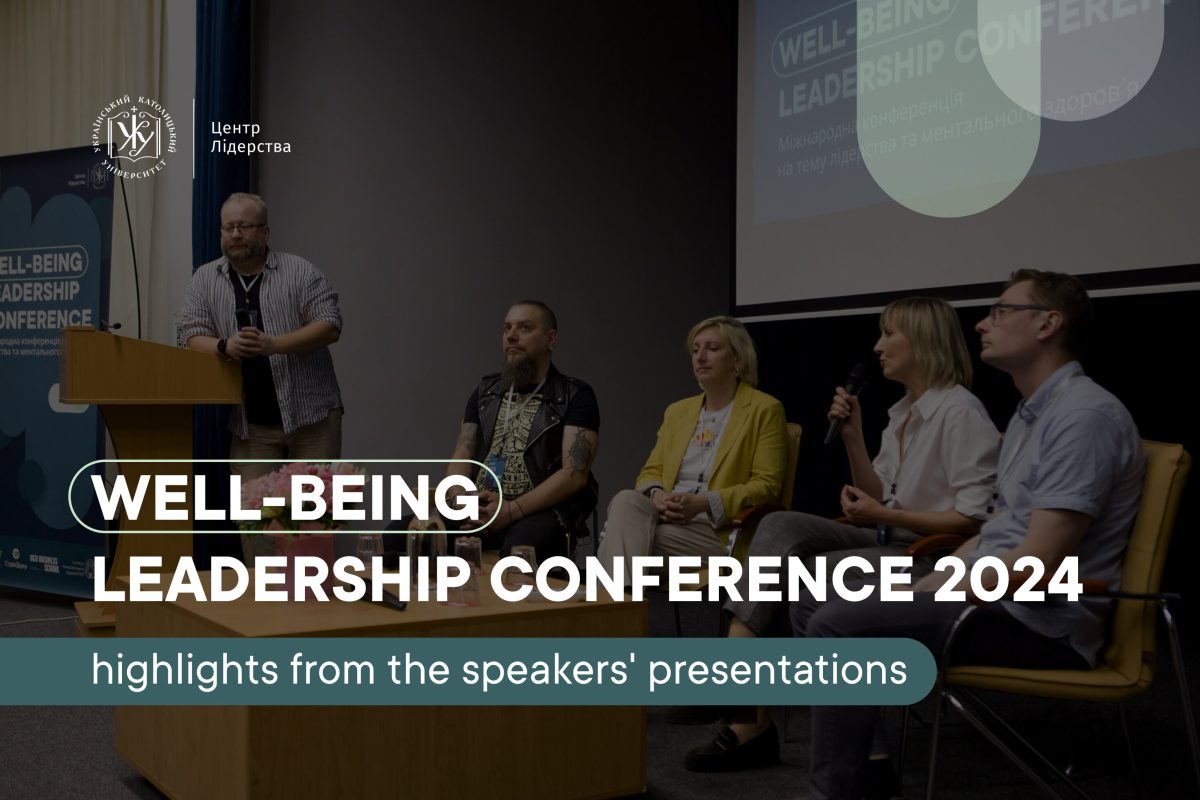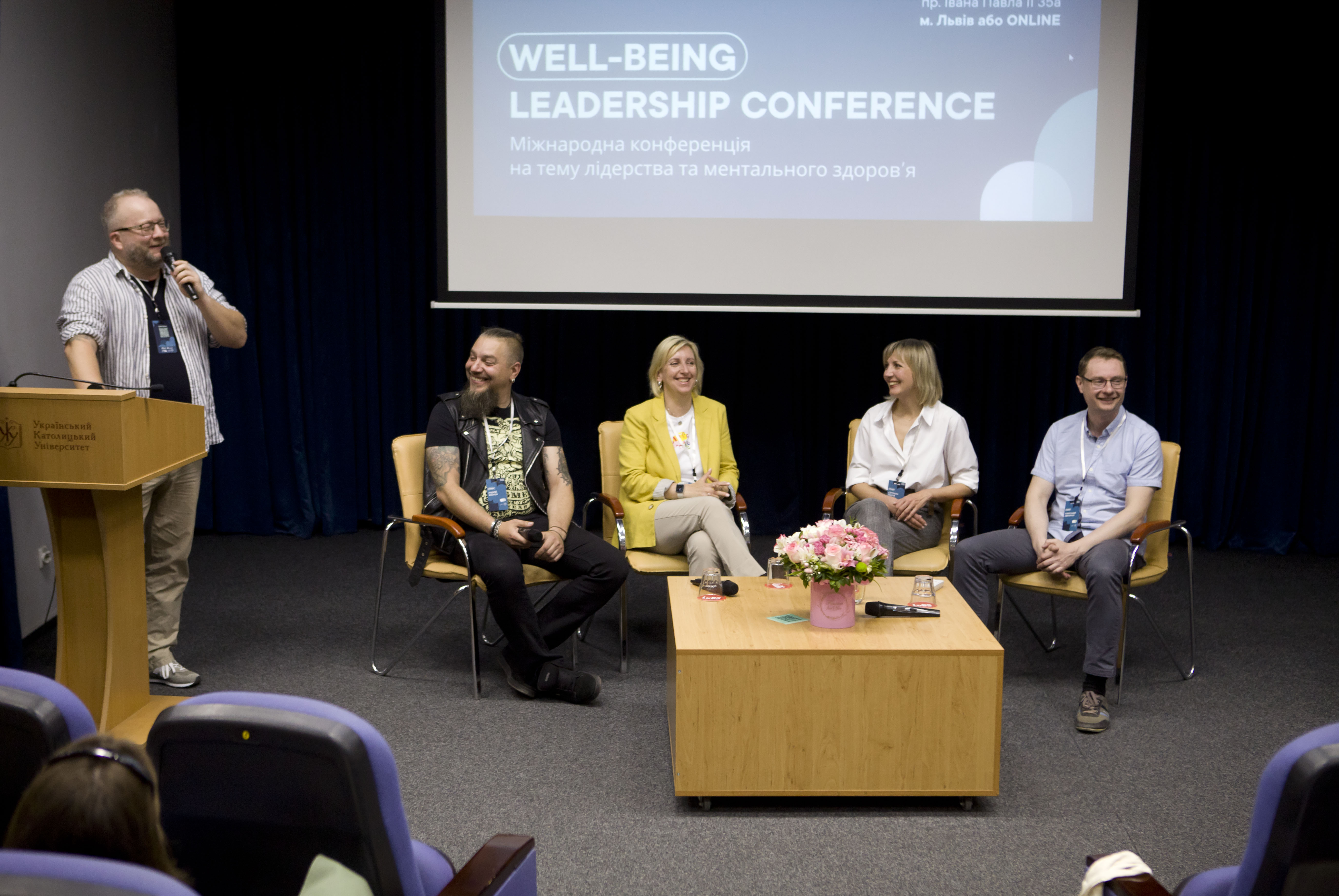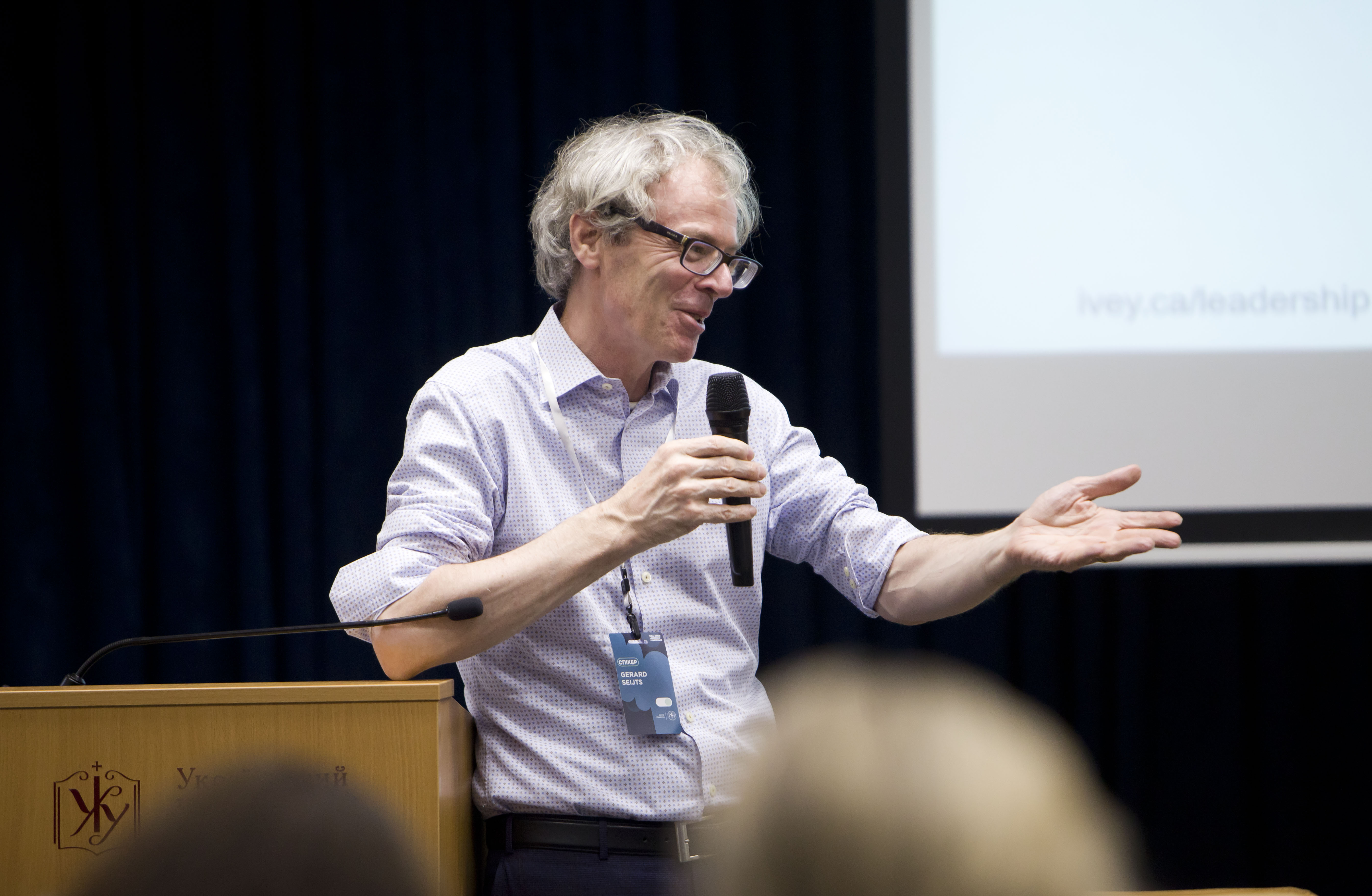
Conclusions from the Well-Being Leadership Conference
How should we perceive Leadership and Well-Being today? Are these concepts exclusively within the scientific domain, or can only practitioners share their experiences?
The Well-Being Leadership Conference is an opportunity to involve international experts from both fields in the study and implementation of leadership culture.
But did we manage to combine academic scholarship with business practices?
Find out more.

The first presentation by Oleksandr Avramchuk, PhD in Psychology, psychotherapist, and Head of the Department of Clinical Psychology at the Faculty of Health Sciences of UCU, had a very clear and intriguing title: “How Avoiding Burnout Provokes Burnout?” The term “burnout” has firmly taken root in business culture in recent years, yet the powerlessness against this phenomenon only continues to grow.
What did we do in this lecture? We explored the scientific foundation of avoidance coping strategies and learned practical tools that can help prevent this state and effectively recover from it.
“We are responsible for what happens to us. Flexibility yields much more effective results than trying to move mountains when exhausted”.
O. Avramchuk

The next speaker, Sofiia Opatska, PhD, founding dean and Chair of the Supervisory Board of the UCU Business School, and Vice-Rector for Strategic Development at UCU, continued the theme of creating conditions for Well-Being or at least a semblance of normalcy in times of Chaos. While the previous presentation offered insights from the perspective of psychology, the main messages here were quotes from the speaker’s research, demonstrating how leaders perceive their role in practice.
“War intensifies the meaning and flavor of life. You want to know that every day you are doing the right things, being useful, and not postponing for later. This is the true essence of life. Now you have no right to slack off; you have to give your all. I want to create symbolic projects”.
S. Opatska
In her presentation, Sofiia Opatska emphasized that people-centricity is no longer a trend but an approach that has been observed for a long time. This term also marked the beginning of the next speaker’s lecture – Svitlana Hnativ.

In her talk, Svitlana Hnativ, an HR Business Partner at Global Logic and a student in the MA in Human Resources and Organization Development program at the UCU Business School, also addressed a very practical aspect of Leadership and subjective Well-Being: approaches to layoffs and employee termination. Given the increasing tension in the HR field and the growing problem of workforce shortages spreading within the business community, this lecture was especially valuable. How we end working relationships is crucial for the potential re-establishment of those relationships in the future and for the employer’s reputation among new job candidates.
Key points that Svitlana Hnativ recommends focusing on:
- Forecasting and planning.
- Building a reserve pool.
- Transparency and clarity in policies and communication.
- Performance evaluation.
- Farewell rituals.
- Financial and social support.

The next lecturer was Andrii Zholob – a veteran, trauma surgeon, journalist, and head of the Center for Providing Services to Combatants in Lviv. He spoke as a representative of Military Leadership and explained the specifics of integrating veterans into organizations.
“This is a profound reevaluation of values. Family comes first if it’s still intact. You come to understand that you should do work for the benefit, not just attend it, not love it, and earn too little money. It’s nerve-wracking, it’s even infuriating”.
A. Zholob
“War is like a childhood home. You’re solely responsible for yourself there. Both bad and very good qualities are sharpened there. Not everyone who returns as a veteran will be an incredible defender, a loving dad, and a hero. But we have to live with them and hire them. We’re all part of a social experiment, where businesses must wait for the right moment when the veteran exhales and is ready to return to society”.
A. Zholob

The first-panel discussion, after Andrii Zholob’s speech, partially addressed questions about Well-Being and Leadership not just as terminology, but as real experiences. Experts from various fields provided several pieces of advice to managers regarding working in organizations with a culture of Well-Being Leadership.

The second segment of the conference began with a presentation by Oleksandra Alkhimovych – a certified HR professional, and lecturer at the Center for Leadership of UCU and the UCU Business School. The speaker presented statistical data and practical tools for creating a well-being workspace.
Oleksandra’s recommendations for managers on the topic “How to work with your team today?”
1. Granting autonomy to individuals.
2. Supporting them, educating them, trusting them.
3. Creating systems for their interaction.
4. Recognizing the results of their work – practicing small victories.

Well-being encompasses the overall state of psychological and physical health. How can the leader of an organization influence the well-being of employees? This question was addressed by the next speaker at the conference – Vira Druz, Head of People and Culture at the IT company AIThoni and a student in the MA in Human Resources and Organization Development program at the UCU Business School.
According to Vira Druz, the behavior of a Leader is one of the four key factors, as it influences the other three, which also shape the sense of Well-Being:
- Identification – how engaged the employee is in the organization.
- Stressors – not just obstacles, but complex factors that can lead to burnout.
- Ethical environment – this pertains to teamwork, support, and communication.

Oleksandra Lyashenko, PhD, professor at the Department of Management and Organizational Development at the UCU Business School, continued the conference with an interactive approach. She asked the audience what they consider safety, dissected this term, and explained the significant role of a sense of safety in shaping human capital.
“When we think about threats, we think like criminals, but when we think about how to create safety, it’s about safety thinking. It involves developing mental health skills every day and is a critically important management tool”.
O. Lyashenko
Continuing the process of integrating science and practical solutions in Leadership, the next speaker focused on how resilience – an integral characteristic of Well-Being Leadership – can be developed in service companies.

Taras Vasylyshyn, managing partner at the Digital agency Panem and a student in the Key Executive MBA program at the UCU Business School, emphasized what Sofiia Opatska and Oleksandra Alkhimovych spoke about – the office today as the norm, and work as a pillar and center of stability. This is a significant transformation because the office became a source of light, energy, and connection during the war.
The speaker also highlighted other signs of business resilience:
- The dynamic potential of organizational adaptability.
- Management of the company’s personnel strengths.
- Dynamic and technological capabilities.
- Adaptability of business models.
- Flexible Leadership.
- Knowledge.
- Innovative ambidexterity.
- Corporate culture.
- Clients and employees as partners.
In this segment, Ukrainian speakers were joined by speakers from Canada. Their presentations could have been neutrally academic, as the context of Ukraine remains indifferent to many in the global community.
However, these individuals are not random, and their contribution to the value of the conference is not only knowledge but also support and interest in exploring Ukrainian Leadership and sharing experiences, and tools.
Therefore, we express gratitude to the Ivey Business School as an institution created by people who share the same values as their Ukrainian colleagues who spoke at the conference before.

The first to join the event was Lucas Monzani, PhD, an assistant professor of organizational behavior at the Ivey Business School.
Together with Andrii Rozhdestvensky, PhD, Executive Director of the Center for Leadership of UCU, lecturer at the UCU Business School, and business consultant, they presented the results of their research on Ukrainian corporate corruption. Describing the course of the study, they voiced their conclusions: the combination of corporate culture, Leader Character, and Leadership stereotypes collectively influences the ethics of subordinates’ decisions.

The next speaker was Seemantini Pathak, PhD, Associate Professor, Ihnatowycz Family Foundation Chair of Leadership. Since social responsibility is a significant factor between Leadership and Well-Being, Seemantini Pathak presented the conference with a study on the characteristics of social responsibility in companies.
1. It was found that the level of social responsibility in companies with more experienced CEOs is lower.
2. The demands on executives’ work can negatively impact organizational outcomes.
3. Social support and feedback for top leaders help mitigate negative consequences.
4. Tendencies of top leaders in information processing also affect the magnitude of negative effects.
5. Female leaders perform better than males regarding corporate social irresponsibility.

The final presentation at the conference was a lecture by Gerard Seijts. As the Center for Leadership of UCU, we have been waiting for this moment for 6 years.
The co-author of the “Leadership based on Character” concept presented findings on the impact of a Leader’s Character in stressful conditions through motivation.
Gerard Seijts began his presentation with summaries and observations from all the speakers’ presentations. He emphasized the connections between each presentation and the common themes among the different perspectives of the lecturers. It was evident here how successfully academic research and practical cases, managerial experience, and the observant eye of researchers were integrated.
Next, Gerard Seijts delved into the analysis of competencies, duties, and the model of the 11 Virtues of a Leader, explaining the methods and results of research on the impact of a Leader’s Character on stress. “Leadership based on Character supports excellent Productivity, Resilience, and Well-Being”. In the following articles, we decided to delve into this lecture in detail because capturing just a few thoughts is insufficient to understand the full scope of this topic.
We thank all the speakers for contributing to creating value at the Well-Being Leadership Conference – 2024. We thank the participants for their high engagement in both offline and online formats.
We also express our gratitude to the event partners.

Please note that the conference recording will soon be available, and we would appreciate feedback on this event through any of our communication channels.